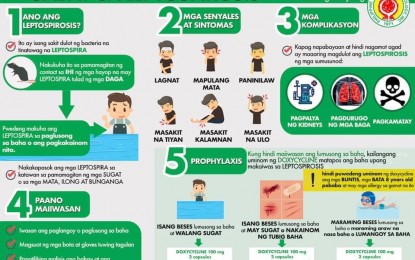
Infographics about the transmission of leptospirosis (Photo courtesy of Dr. Maria Theresa Bad-ang)
DAVAO CITY – As the city continues to experience heavy rains due to La Niña weather patterns, a health expert warned the public on Wednesday against the threat of leptospirosis which she said could be very fatal.
In an interview, Dr. Ma. Theresa Bad-ang, nephrologist and head of Southern Philippines Medical Center-Human Advocate and Retrieval Effort (SPMC-SHARE), urged the public not to wade through floodwaters to avoid the infection, especially during this rainy season.
Leptospirosis, a bacterial infection that can cause heart, liver, and kidney failure in severe cases.
“Catching colds nowadays is not only caused by coronavirus disease, but it could also be dengue or the worst leptospirosis,” she told the Philippine News Agency (PNA).
The Davao City Disaster Risk Reduction and Management Office (CDRRMO) reported on Tuesday that 850 households were affected by flooding due to the heavy downpour on Monday night.
“Just like what happened in the recent flooding, if you are wading through floodwaters you have to wear protective gear such as boots and wash your feet thoroughly with soap,” Bad-ang said.
Should they feel ill after the flooding, she urged the public to go to their nearest health center, and consult with a doctor if symptoms persist.
“Could this be fatal if not treated? Very fatal. It will need emergency dialysis. However, it may be prevented if identified and treated early,” Bad-ang said.
She said humans can become infected with leptospirosis through contact with urine (or other body fluids, except saliva) from infected animals.
It can also be acquired through water, soil, or food contaminated with the urine of infected animals.
Non-specific symptoms or signs of a person having leptospirosis can be fever, muscle pain, and headache. In some cases, calf-muscle pain and reddish eyes are the symptoms.
Severe cases can result in liver or kidney failure, with the brain being affected. Noticeable signs can be a yellowish body discoloration, dark-colored urine and light stools, low urine output, and severe headache.
“Prophylaxis is a must especially if you have a wound and you have a history of wading in floodwaters,” Bad-ang further said. (PNA)
